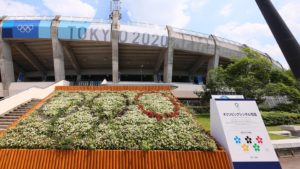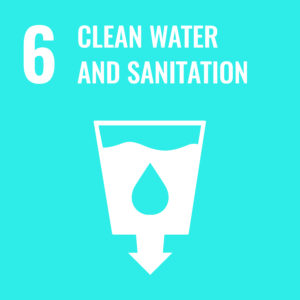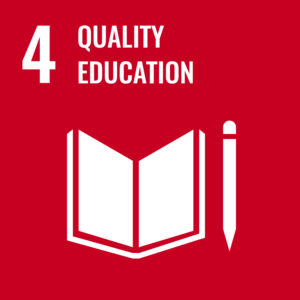
To celebrate the 17 days of competition at the Olympic Games Tokyo 2020, each day we will celebrate the power of sport and its influence in relation to each of the 17 Sustainable Development Goals (SDGs).
Today is dedicated to Goal 9: Goal 9 aims to build resilient infrastructure, promote sustainable industrialization and foster innovation.
It has eight targets, and progress is measured by twelve indicators. The first five targets are "outcome targets": Develop sustainable, resilient and inclusive infrastructures; promote inclusive and sustainable industrialization; increase access to financial services and markets; upgrade all industries and infrastructures for sustainability; enhance research and upgrade industrial technologies. The remaining three targets are "means of achieving" targets: Facilitate sustainable infrastructure development for developing countries; support domestic technology development and industrial diversification; universal access to information and communications technology.
- The growing scale of the sport industry, and its links with other sectors, offer opportunities for economic growth and decent employment.
- Stakeholders in sport that base their activity on the respect of human rights can spur to positively impact local and regional business when organizing sport events.
- Sport goods and equipment should be produced in line with labour standards and in particular free from forced and child labour and discriminations of all forms.
- Sport programmes can foster increased employability for women, people with disabilities and other vulnerable groups, thus contributing to inclusive economic growth.
- Sport-based educational programmes provide skills for employability and opportunities to enter the labour market for youth.
- Sport-based employment and entrepreneurship can contribute to create decent jobs for all by complying with labour standards throughout their value chain and in line with businesses policies and practices.
- Sport can generate enhanced overall community involvement, and it can motivate mobilization of the wider community and growth of economic activities associated with sport.
- Sport events can have long lasting effects on the population if they involve the population for their legacy, to be in line with human rights and labour standards, and to be sustainable.
- Sport organizations and sport events, if they adopt adequate policies and procedures, can be an opportunity for capacity building, creating jobs, and for economic, social and environmental sustainable development in general.
- Sport tourism, including tourism involving sport events, can create jobs and promote local culture and products.
- Sport can promote the effective and responsible management of volunteers, helping to promote their participation in society and community engagement.
Click here for a list of examples of how sport addresses the SDG 9

To celebrate the 17 days of competition at the Olympic Games Tokyo 2020, each day we will celebrate the power of sport and its influence in relation to each of the 17 Sustainable Development Goals (SDGs).
Today is dedicated to Goal 8: The full title of Goal 8 is to: "Foster sustained, inclusive and sustainable economic growth, full and productive employment and decent work for all." Progress towards targets will be measured, monitored and evaluated by 17 indicators.
SDG 8 has twelve targets in total to be achieved by 2030. Some targets are for 2030; others are for 2020. The first ten are "outcome targets". These are: sustainable economic growth; diversify, innovate and upgrade for economic productivity; promote policies to support job creation and growing enterprises; improve resource efficiency in consumption and production; full employment and decent work with equal pay; promote youth employment, education and training; end modern slavery, trafficking, and child labour; protect labour rights and promote safe working environments; promote beneficial and sustainable tourism; universal access to banking, insurance and financial services. In addition there are also two targets for "means of achieving": Increase aid for trade support; develop a global youth employment strategy.
- The growing scale of the sport industry, and its links with other sectors, offer opportunities for economic growth and decent employment.
- Stakeholders in sport that base their activity on the respect of human rights can spur to positively impact local and regional business when organizing sport events.
- Sport goods and equipment should be produced in line with labour standards and in particular free from forced and child labour and discriminations of all forms.
- Sport programmes can foster increased employability for women, people with disabilities and other vulnerable groups, thus contributing to inclusive economic growth.
- Sport-based educational programmes provide skills for employability and opportunities to enter the labour market for youth.
- Sport-based employment and entrepreneurship can contribute to create decent jobs for all by complying with labour standards throughout their value chain and in line with businesses policies and practices.
- Sport can generate enhanced overall community involvement, and it can motivate mobilization of the wider community and growth of economic activities associated with sport.
- Sport events can have long lasting effects on the population if they involve the population for their legacy, to be in line with human rights and labour standards, and to be sustainable.
- Sport organizations and sport events, if they adopt adequate policies and procedures, can be an opportunity for capacity building, creating jobs, and for economic, social and environmental sustainable development in general.
- Sport tourism, including tourism involving sport events, can create jobs and promote local culture and products.
- Sport can promote the effective and responsible management of volunteers, helping to promote their participation in society and community engagement.
Click here for a list of examples of how sport addresses the SDG 8

To celebrate the 17 days of competition at the Olympic Games Tokyo 2020, each day we will celebrate the power of sport and its influence in relation to each of the 17 Sustainable Development Goals (SDGs).
Today is dedicated to Goal 7: Goal 7 aims to "Ensure access to affordable, reliable, sustainable and modern energy for all." Access to energy is a very important pillar for the wellbeing of the people as well as economic development and poverty alleviation.
The goal has five targets to be achieved by 2030. Progress towards the targets is measured by six indicators. Three out of the five targets are "outcome targets": Universal access to modern energy; increase global percentage of renewable energy; double the improvement in energy efficiency. The remaining two targets are "means of achieving targets": to promote access to research, technology and investments in clean energy; and expand and upgrade energy services for developing countries. In other words, these targets include access to affordable and reliable energy while increasing the share of renewable energy in the global energy mix.
- Sport programmes and activities can support initiatives aiming at developing energy provision systems and ensuring access to energy.
- Sport can be a forum for discussion and promotion of energy efficiency. It can promote energy efficiency and clean energy through joint work by relevant stakeholders.
- Sport facilities and sport events can contribute to targets concerning renewable energy, energy efficiency and access to clean energy by respecting standards and recommendations in these regards.
- Sport infrastructures can promote organization models that adopt clean and sustainable energy use.
Click here for a list of examples of how sport addresses the SDG 7

Tokyo 2020 “Recovery Olympics” give hope to regions affected by the Great East Japan Earthquake
When the Tokyo 2020 Olympic Torch Relay began in March 2021, it carried a special meaning for Japan and its people. The flame’s journey […]



To celebrate the 17 days of competition at the Olympic Games Tokyo 2020, each day we will celebrate the power of sport and its influence in relation to each of the 17 Sustainable Development Goals (SDGs).
Today is dedicated to Goal 6: The six "outcome-oriented targets" of SDG 6 include: Safe and affordable drinking water; end open defecation and provide access to sanitation and hygiene, improve water quality, wastewater treatment and safe reuse, increase water-use efficiency and ensure freshwater supplies, implement IWRM (Integrated water resources management), protect and restore water-related ecosystems. The two "means of achieving" targets are to expand water and sanitation support to developing countries, and to support local engagement in water and sanitation management
- Sport can be an effective educational platform for disseminating messages on water sanitation requirements and management. Educational messages regarding sanitation and hygiene can be transmitted through sport programmes.
- Sport and sport facilities can contribute to targets on water and sanitation by respecting standards and recommendations.
- Access to adequate and equitable sanitation and hygiene for all can be enhanced through sport settings such as sport facilities adequately equipped to this end. Water-use efficiency can be increased in the sport sector, particularly in sport facilities.
- Improvements in water quality by reducing pollution, dumping and wastewater can be promoted and realized in sport contexts such as aquatic and other sport events.
- Sport can raise awareness on the importance to limit or ban single-use plastic and micro- beads and develop campaigns and initiatives to educate and change the behaviours of spectators and consumers.
Click here for a list of examples of how sport addresses the SDG 6

The IOC Refugee Olympic Team: a team powered by solidarity
Ten athletes from the IOC Refugee Olympic Team (EOR) started their competitions in Tokyo over the first weekend of the Games, displaying the same […]




Czech Floorball launches environmental sustainability programme
Czech Floorball wants to grasp the topic of environmental sustainability not only as a global trend, but as the right thing for the future […]



To celebrate the 17 days of competition at the Olympic Games Tokyo 2020, each day we will celebrate the power of sport and its influence in relation to each of the 17 Sustainable Development Goals (SDGs).
Today is dedicated to Goal 5: Goal 5 aims to eliminate all forms of discrimination and violence against women in the public and private spheres and to undertake reforms to give women equal rights to economic resources and access to ownership of property.
- Sport can be a powerful platform for advocacy and awareness raising for gender equality. It can contribute to abolish all forms of discrimination against women and girls; human rights based rules of a sport can help to replace culturally discriminative norms that exclude women and girls from sport.
- While women and girls’ rights to participate in sport as athletes or spectators are not respected in many countries, sport can help to foster gender equality in countries and regions where women are discriminated.
- Addressing current gender inequalities across participation, performance and leadership in sport can make a valuable contribution to this Goal. Sport can be used to address constricting gender norms and to promote equal participation of girls and women in sport.
- Sport and sport-based community programmes in particular can, if designed inclusively, cause positive shifts in gender norms and promote gender equality.
- Sport can foster increased self-esteem and confidence of women and girls, empower them and develop skills needed to become equal participants and leaders in their communities. Through sport-based programmes, women and girls can be equipped with knowledge and skills on health, on how to live a healthy and active lifestyle, on how to act in case they experience violence, on employability, and with leadership skills needed to progress in society.
- Sport can provide safe and fair environments for women and girls. A safe playing area for girls is especially essential, for instance in refugee camps.
- Sport can raise awareness and address abuse and gender-based violence within sport.
- Men and boys can be engaged in achieving gender equality in and through sport.
- Sport can promote better gender relations and cooperation.
Click here for a list of examples of how sport addresses the SDG 5

To celebrate the 17 days of competition at the Olympic Games Tokyo 2020, each day we will celebrate the power of sport and its influence in relation to each of the 17 Sustainable Development Goals (SDGs).
Today is dedicated to Goal 4: Ensure inclusive and equitable quality education and promote lifelong learning opportunities for all. SDG 4 has ten targets which are measured by 11 indicators. The seven "outcome-oriented . targets" are: free primary and secondary education; equal access to quality pre-primary education; affordable technical, vocational and higher education; increased number of people with relevant skills for financial success; elimination of all discrimination in education; universal literacy and numeracy; and education for sustainable development and global citizenship. The three "means of achieving targets" are: build and upgrade inclusive and safe schools; expand higher education scholarships for developing countries; and increase the supply of qualified teachers in developing countries.
- The right to education and equal rights of women and girls in the field of education form the basis of this goal. Inclusive sport activities have long been used to foster education and have therefore been identified as a tool to advance those rights.
- Sport can encourage inclusion and the equal participation of women and girls, people with disabilities, and other vulnerable or underrepresented groups and individuals.
- Stakeholders in sport and education can cooperate to promote tolerance, diversity and non-discrimination in school programmes.
Joint programmes with schools offer additional and alternative physical education and physical activities to support the full learning process and deliver holistic education. - Sport can improve learning outcomes by fostering academic performance and achievement, leadership abilities, and concentration and focus capabilities.
- Sport-based programmes offer education opportunities and life skills to be used beyond school including the workplace.
Sport, physical education, physical activity and play can motivate children and youth to attend school and engage with formal and informal education. Sport programmes for girls, including in refugee camps, can be used as an incentive to stay in school. - Sport can raise awareness about sustainability through designing sustainable educational curriculums and greening schools and universities.
Click here for a list of examples of how sport addresses the SDG 4

To celebrate the 17 days of competition at the Olympic Games Tokyo 2020, each day we will celebrate the power of sport and its influence in relation to each of the 17 Sustainable Development Goals (SDGs).
Today is dedicated to Goal 3: Good health and well-being. This Goal addresses all major health priorities, including reproductive, maternal and child health; communicable, non-communicable and environmental diseases; universal health coverage; and access for all to safe, effective, quality and affordable medicines and vaccines.
- The right to health serves as the basis for achieving healthy lives through physical activity and sport.
- Physical inactivity has been identified as the fourth leading risk factor for global mortality by the World Health Organization. Regular sport is a countermeasure available to nearly everyone, which can also address the economic impact of physical inactivity.
- Sport and physical activity reduce the risk of contracting non communicable diseases by strengthening cardiovascular health in particular. Participation in sport can contribute to tackling and preventing obesity.
- Sport encourages individuals, including the elderly, to adopt active lifestyles. It has a positive impact on child and healthy adolescent development and well-being.
- Sport can help reduce infant, child and maternal mortality and improve post-natal recovery by increasing personal fitness of mothers and contributing to the prevention of play-related deaths. By implementing child safeguarding measures, sport programmes can ensure the safety and well-being of children and cause change in other sectors by setting a good example.
- Sport-based education programmes are a viable platform for health education, including for hard-to-reach groups, particularly to disseminate information on sexual and reproductive health, alcohol and substance abuse, as well as communicable diseases such
as malaria and HIV/AIDS. - Sport-based social programmes promote mental well-being for at-risk communities through trauma counselling and inclusion efforts. Sport can enhance mental health by delivering social, psychological and physiological benefits.
- Sport programmes in refugee camps which are run as organized projects on a continual basis can deliver social, psychological and physiological benefits.
- Sport can promote sustainable lifestyles and encourage demand for sustainable consumption of goods and services. Sport can raise awareness about the need for sustainable consumption and production for healthy life and healthy people.
- Sport can promote the importance of clean air for health and can provide sustainable solutions.
Click here for a list of examples of how sport addresses the SDG 3